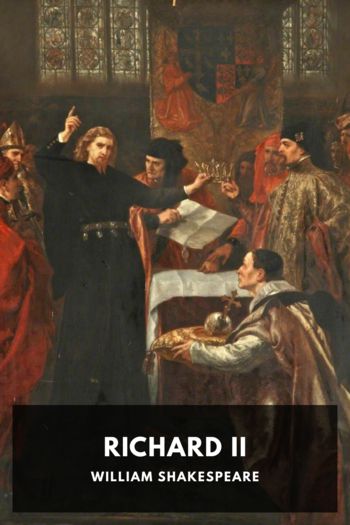Richard II, William Shakespeare [most life changing books .TXT] 📗

- Author: William Shakespeare
Book online «Richard II, William Shakespeare [most life changing books .TXT] 📗». Author William Shakespeare
No joyful tongue gave him his welcome home:
But dust was thrown upon his sacred head;
Which with such gentle sorrow he shook off,
His face still combating with tears and smiles,
The badges of his grief and patience,
That had not God, for some strong purpose, steel’d
The hearts of men, they must perforce have melted
And barbarism itself have pitied him.
But heaven hath a hand in these events,
To whose high will we bound our calm contents.
To Bolingbroke are we sworn subjects now,
Whose state and honour I for aye allow. Duchess Here comes my son Aumerle. York
Aumerle that was;
But that is lost for being Richard’s friend,
And, madam, you must call him Rutland now:
I am in parliament pledge for his truth
And lasting fealty to the new-made king.
Welcome, my son: who are the violets now
That strew the green lap of the new come spring?
Madam, I know not, nor I greatly care not:
God knows I had as lief be none as one.
Well, bear you well in this new spring of time,
Lest you be cropp’d before you come to prime.
What news from Oxford? hold those justs and triumphs?
What seal is that, that hangs without thy bosom?
Yea, look’st thou pale? let me see the writing.
No matter, then, who see it:
I will be satisfied; let me see the writing.
I do beseech your grace to pardon me:
It is a matter of small consequence,
Which for some reasons I would not have seen.
Which for some reasons, sir, I mean to see.
I fear, I fear—
What should you fear?
’Tis nothing but some bond, that he is enter’d into
For gay apparel ’gainst the triumph day.
Bound to himself! what doth he with a bond
That he is bound to? Wife, thou art a fool.
Boy, let me see the writing.
I will be satisfied; let me see it, I say. He plucks it out of his bosom and reads it.
Treason! foul treason! Villain! traitor! slave!
Saddle my horse.
God for his mercy, what treachery is here!
Give me my boots, I say; saddle my horse. Exit Servant.
Now, by mine honour, by my life, by my troth,
I will appeach the villain.
Good mother, be content; it is no more
Than my poor life must answer.
Strike him, Aumerle. Poor boy, thou art amazed.
Hence, villain! never more come in my sight.
Why, York, what wilt thou do?
Wilt thou not hide the trespass of thine own?
Have we more sons? or are we like to have?
Is not my teeming date drunk up with time?
And wilt thou pluck my fair son from mine age,
And rob me of a happy mother’s name?
Is he not like thee? is he not thine own?
Thou fond mad woman,
Wilt thou conceal this dark conspiracy?
A dozen of them here have ta’en the sacrament,
And interchangeably set down their hands,
To kill the king at Oxford.
He shall be none;
We’ll keep him here: then what is that to him?
Away, fond woman! were he twenty times my son,
I would appeach him.
Hadst thou groan’d for him
As I have done, thou wouldst be more pitiful.
But now I know thy mind; thou dost suspect
That I have been disloyal to thy bed,
And that he is a bastard, not thy son:
Sweet York, sweet husband, be not of that mind:
He is as like thee as a man may be,
Not like to me, or any of my kin,
And yet I love him.
After, Aumerle! mount thee upon his horse;
Spur post, and get before him to the king,
And beg thy pardon ere he do accuse thee.
I’ll not be long behind; though I be old,
I doubt not but to ride as fast as York:
And never will I rise up from the ground
Till Bolingbroke have pardon’d thee. Away, be gone! Exeunt.
A royal palace.
Enter Bolingbroke, Percy, and other Lords. BolingbrokeCan no man tell me of my unthrifty son?
’Tis full three months since I did see him last:
If any plague hang over us, ’tis he.
I would to God, my lords, he might be found:
Inquire at London, ’mongst the taverns there,
For there, they say, he daily doth frequent,
With unrestrained loose companions,
Even such, they say, as stand in narrow lanes,
And beat our watch, and rob our passengers;
Which he, young wanton and effeminate boy,
Takes on the point of honour to support
So dissolute a crew.
My lord, some two days since I saw the prince,
And told him of those triumphs held at Oxford.
His answer was, he would unto the stews,
And from the common’st creature pluck a glove,
And wear it as a favour; and with that
He would unhorse the lustiest challenger.
As dissolute as desperate; yet through both
I see some sparks of better hope, which elder years
May happily bring forth. But who comes here?
What means our cousin, that he stares and looks
So wildly?
God save your grace! I do beseech your majesty,
To have some conference with your grace alone.
Withdraw yourselves, and leave us here alone. Exeunt Percy and Lords.
What is the matter with our cousin now?
For ever may my knees grow to the earth,
My tongue cleave to my roof within my mouth,
Unless a pardon ere I rise or speak.
Intended or committed





Comments (0)